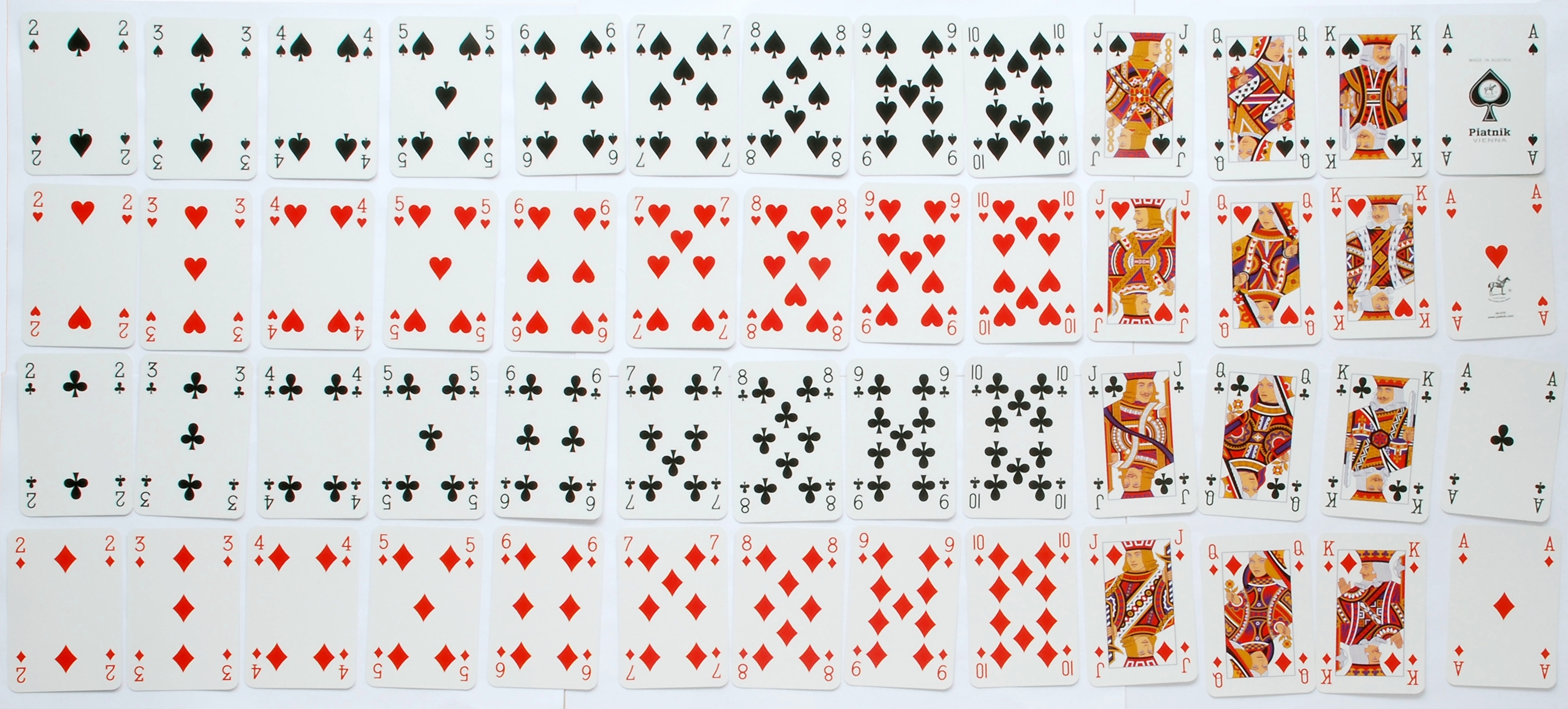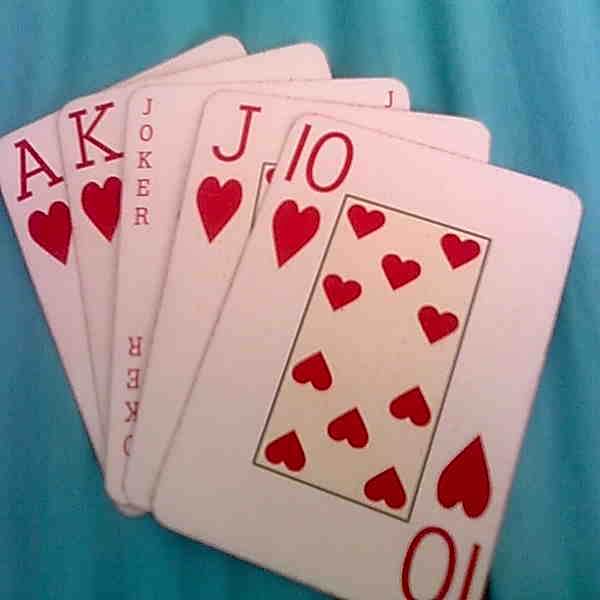|
Canasta
Canasta (; Spanish language, Spanish for "basket") is a card game of the rummy family of games believed to be a variant of 500 rum. Although many variations exist for two, three, five or six players, it is most commonly played by four in two partnerships with two standard decks of cards. Players attempt to make Meld (cards), melds of seven cards of the same rank and "go out" by playing all cards in their hands. History The game of Canasta was devised by attorney Segundo Sánchez Santos and his Contract bridge, Bridge partner, architect Alberto Serrato in Montevideo, Uruguay, in 1939,American Heritage Dictionar''Spanish Word Histories and Mysteries: English Words That Come from Spanish'' Houghton Mifflin Harcourt (2007), in an attempt to design a time-efficient game that was as engaging as Bridge. They tried different formulas before inviting Arturo Gómez Hartley and Ricardo Sanguinetti to test their game. After a positive reception of Canasta at their local bridge club, the J ... [...More Info...] [...Related Items...] OR: [Wikipedia] [Google] [Baidu] |
500 Rum
500 rum, also called pinochle rummy, Michigan rummy, Persian rummy, rummy 500 or 500 rummy, is a popular variant of rummy.500 Rum , ''Pagat.com'' (Card Game Rules). The game of canasta and several other games are believed to have developed from this popular form of rummy. The distinctive feature of 500 rum is that each player scores the value of the sets or cards they meld. It may be played by 2 to 8 players, but it is best for 3 to 5. The term ''Michigan rummy'' may also refer to an unrelated game, very similar to the Canadian Rummoli (both sharing traits with the much older Poch), involving a playing board, chips, and accumulated pots that are awarded to players who play certain cards. Rules The cards and dealing 500 rum is played using a standard French deck and can use 52 cards, or 53–54 card ...[...More Info...] [...Related Items...] OR: [Wikipedia] [Google] [Baidu] |
Rummy
Rummy is a group of games related by the feature of matching playing cards, cards of the same rank or sequence and same suit. The basic goal in any form of rummy is to build ''Meld (cards), melds'' which can be either Set (cards), sets (three or four of a kind of the same rank) or Run (cards), runs (three or more sequential cards of the same suit) and either be first to Go out (cards), go out or to amass more points than the opposition. Origin There are two common theories about the origin of rummy, attributing its origins in either Mexico or China in the nineteenth century. The first is that it originated in Mexico around the 1890s in a game described as Conquian in R.F. Foster's book ''Foster's Complete Hoyle'', which was played with a 40 card Spanish deck and had melding mechanics. The second is that Rummy originated in Asia, and that Rummy was the result of a Mahjongg, Mahjong variant named Kun P'ai that was Westernized as Khanhoo by W.H. Wilkinson in 1891. Games schola ... [...More Info...] [...Related Items...] OR: [Wikipedia] [Google] [Baidu] |
Mille (card Game)
Mille is a two-player card game requiring two standard 52-card decks. Mille is a rummy game similar to canasta in the respects that if a player picks up cards from the discard pile, the player picks up the entire pile, and the only legal melds are three or more cards of a same rank. Origins The two-player rummy game Mille is said to have been devised in Montreal, Québec and from there brought to Toronto in the 1990s. It has since become increasingly popular. Basic rules The dealer deals 15 cards to their opponent and themself, then turns over a card from the deck. On a player's turn, they have two options: pick up the "pack", or draw a card from the deck. If the player has a pair in their hand of the last card discarded, they have the option of picking the pack up. The only exception to this rule is if the up card opened immediately after the deal is a 2. The player can pick it up; they don't have to use it immediately or have a pair of 2's. When picking up the pack, the player ... [...More Info...] [...Related Items...] OR: [Wikipedia] [Google] [Baidu] |
Meld (cards)
In card games, a meld is a set of matching cards, typically three or more, that earn a player points and/or allow them to deplete their hand. Melds typically come in sequences of ascending cards belonging to the same suit known as '' runs'' () or ''sets/groups'' of cards of identical rank (). Other ones may be ''marriage'' (e.g. K and Q) and ''bezique'' (Q and J). Melding is typical in games of the rummy family, such as canasta Canasta (; Spanish language, Spanish for "basket") is a card game of the rummy family of games believed to be a variant of 500 rum. Although many variations exist for two, three, five or six players, it is most commonly played by four in two par ... and gin. It is also used in other games such as mahjong. Melds are also made in some trick-taking games, such as pinochle and bezique.Parlett (2008), pp. 287-291, 295-296. See also * Run (cards) * Set (cards) References Bibliography * Parlett, David. ''The Penguin Book of Card Games''. Lond ... [...More Info...] [...Related Items...] OR: [Wikipedia] [Google] [Baidu] |
Joker (card)
The Joker is a playing card found in most modern French-suited card decks, as an addition to the standard four suits (Clubs, Diamonds, Hearts, and Spades). Since the second half of the 20th century, they have also been found in Spanish- and Italian-suited decks, excluding stripped decks. The Joker originated in the United States during the Civil War, and was created as a trump card for the game of Euchre. It has since been adopted into many other card games, where it often acts as a wild card, but may have other functions such as the top trump, a skip card (forcing another player to miss a turn), the lowest-ranking card, the highest-value card, or a card of a different value from the rest of the pack (see e.g. Zwicker which has six Jokers with this function). By contrast, a wild card is any card that may be used to represent another card or cardsit does not need be a Joker. Origin The game of Euchre is credited with the introduction of the Joker into card games. However, ... [...More Info...] [...Related Items...] OR: [Wikipedia] [Google] [Baidu] |
French-suited
French-suited playing cards or French-suited cards are cards that use the French suits of (clovers or clubs ), (tiles or diamonds ), (hearts ), and (pikes or spades ). Each suit contains three or four face/court cards. In a standard 52-card deck these are the ( knave or jack), the ( lady or queen), and the (king). In addition, in Tarot packs, there is a (knight) ranking between the queen and the jack. Aside from these aspects, decks can include a wide variety of regional and national patterns, which often have different deck sizes. In comparison to Spanish, Italian, German, and Swiss playing cards, French cards are the most widespread due to the geopolitical, commercial, and cultural influence of France, the United Kingdom, and the United States in the 19th and 20th centuries. Other reasons for their popularity were the simplicity of the suit insignia, which simplifies mass production, and the popularity of whist and contract bridge. The English ... [...More Info...] [...Related Items...] OR: [Wikipedia] [Google] [Baidu] |
Natural Card
The following is a glossary of terms used in card games. Besides the terms listed here, there are thousands of common and uncommon slang terms. Terms in this glossary should not be game-specific (e.g. specific to bridge, hearts, poker or rummy), but apply to a wide range of card games played with non-proprietary packs. It should not include terms solely related to casino or banking games. For glossaries that relate primarily to one game or family of similar games, see Game-specific glossaries. A ; ace # The card with one pip in a pack of cards. Usually the highest card of a suit, ranking immediately above the king. May also occupy the lowest rank. # Commonly refers to the Deuce or Two in German-suited packs which don't have real Aces. Often the highest card of a suit. ; acorns : One of the four suits in a German-suited pack of cards. Symbol: ; active # A card that is in play i.e. not sleeping. # See active player. ; active player # A player who receives card ... [...More Info...] [...Related Items...] OR: [Wikipedia] [Google] [Baidu] |
Picking Up The Discard Pile
Picking or Pickings may refer to: Activities * Fruit picking * Guitar picking, various techniques for playing a guitar * Lock picking, the art of unlocking a lock without the original key * Nose picking, the act of extracting mucus and/or foreign bodies from the nose * Skin picking, or Dermatillomania * Continental knitting, a style of knitting also known as picking * In computer graphics Computer graphics deals with generating images and art with the aid of computers. Computer graphics is a core technology in digital photography, film, video games, digital art, cell phone and computer displays, and many specialized applications. ..., the task of determining which screen-rendered object a user has clicked on * Order picking, in logistics the task of selecting an item for shipment People * Jake Picking (born 1991), American actor * Jonti Picking (born 1975), British web personality and flash animator * Sherwood Picking (1890–1941), United States Navy officer Other uses ... [...More Info...] [...Related Items...] OR: [Wikipedia] [Google] [Baidu] |
Wild Card (card Games)
A wild card in card games is one that may be used to represent any other playing card, sometimes with certain restrictions. Jokers are often used as wild cards, but other cards may be designated as wild by the rules or by agreement. In addition to their use in card games played with a standard pack, wild cards may also exist in dedicated deck card games, such as the 'Master' card in Lexicon. Use A wild card is one that may be used to represent any natural card, its holder usually designating its rank and suit. Jokers are frequently used as wild cards, for example in games of the Rummy family. Jokers, however, may also have other uses, such as being a permanent top trump in games like Euchre or 500, the odd one out in Old Maid, or high-value matching cards in Zwicker. In many games, ordinary cards may be designated as wild, for example, the and in Classic Brag or the "deuces wild" in Poker. [...More Info...] [...Related Items...] OR: [Wikipedia] [Google] [Baidu] |




